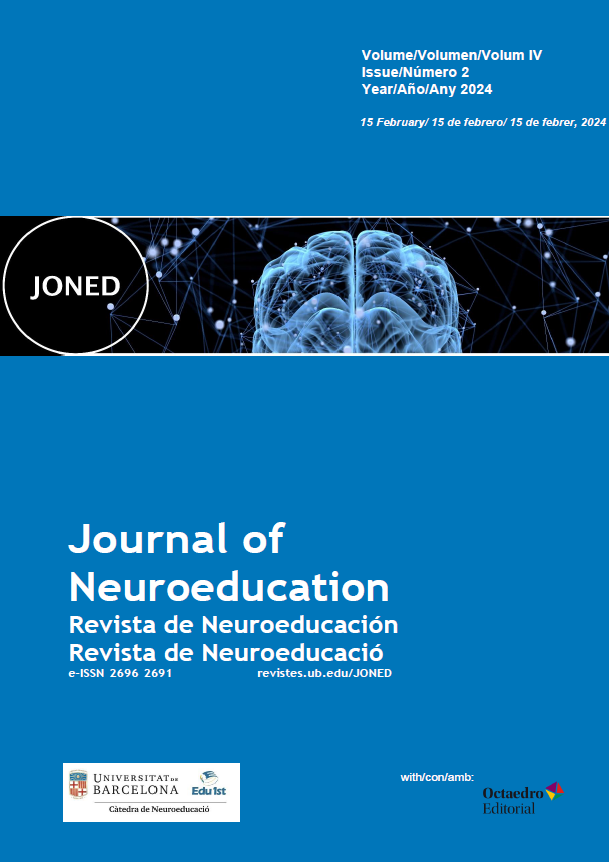Intervención neurodidáctica sobre las funciones ejecutivas en adolescentes
Neurodidáctica y Funciones Ejecutivas
Palabras clave:
Neurodidáctica; Funciones ejecutivas; Prácticas pedagógicas, Adolescentes.Resumen
Se presenta aquí un informe de avance con los resultados preliminares de un estudio longitudinal iniciado durante el ciclo lectivo 2021 (actualmente en curso), enmarcado desde un enfoque ecológico de la neurodidáctica, cuyo objetivo es conocer los posibles efectos de la implementación de prácticas pedagógicas diseñadas para potenciar las funciones ejecutivas en adolescentes. Participaron del estudio 38 estudiantes de nivel secundario, conformándose un grupo Experimental y un grupo Control que fueron evaluados en dos fases con pruebas paramétricas (pre y post-intervención). El grupo Experimental participó de la intervención neurodidáctica por un periodo de 12 meses, mediante la inserción en el currículum académico de actividades específicas para la promoción de las FE. El análisis del efecto de la intervención reveló cambios significativos para ambos grupos; con mayores ganancias para el grupo Experimental (cambios en 13 variables) en comparación con el Control (cambios en 9 variables), evidenciando una tendencia marcada hacia la mejoría en el rendimiento de tareas que evaluaron planificación, memoria de trabajo, flexibilidad cognitiva, control inhibitorio y atención. Esta investigación en curso posibilita concluir que el diseño de las intervenciones pedagógicas no es un esfuerzo aislado sino que involucra un trabajo colaborativo entre docentes, quienes asumiendo un rol activo pueden favorecer el desarrollo neurocognitivo de sus estudiantes.
Descargas
Citas
Muchiut AF et al. Neurodidáctica y autorregulación del aprendizaje, un camino de la teoría a la práctica. Rev. Iberoamericana de Educación. 2018; 78(1): 205-219. https://dialnet.unirioja.es/servlet/articulo?codigo=6711421.
Araya-Pizarro SC, Espinoza Pasten L. Aportes desde las neurociencias para la comprensión de los procesos de aprendizaje en los contextos educativos. Propós. represent. 2020; 8(1): e312. http://dx.doi.org/10.20511/pyr2020.v8n1 .312
Muchiut AF, Vaccaro P, Pietto LP. Towards an Ecological Vision of Neurodidactics. J. Edu. Psyc. Res. 2022; 4(2): 428-432. https://opastpublishers.com/open-access/towards-an-ecologicalvision-of-neurodidactics.pdf
Willoughby M, Hudson K, Hong Y, Wylie A. Improvements in motor competence skills are associated with improvements in executive function and math problem-solving skills in early childhood. Developmental Psychology. 2021; 57(9): 1463–1470. https://doi.org/10.1037/dev0001223
Doebel S. Rethinking executive function and its development. Perspect on Psychol Sci. 2020; 15(4): 942-956. doi: 10.1177/1745691620904771.
Gogtay N et al. Dynamic mapping of human cortical development during childhood through early adulthood. Proceedings of the National Academy of Sciences of the United States of America. 2004; 101(21), 8174–8179. doi:10.1073/pnas.0402680101
McClelland MM, Geldhof G, Cameron CE, Wanless, S. B. Development and self‐regulation. Hand. of life cour. heal. develop. sci. 2015; 1-43. doi: 10.1002/9781118963418.childpsy114
Lerner D. Enseñar en la diversidad. Lectura y vida : Rev. Latinoam. de lectura. 2007; 28 (4): 6-17. https://dialnet.unirioja.es/servlet/articulo?codigo=2522736
Korzeniowski CG. Desarrollo evolutivo del funcionamiento ejecutivo y su relación con el aprendizaje escolar. Rev. de Psicología. 2011; 7 (13): 52-64.https://ri.conicet.gov.ar/handle/11336/94811
Clair-Thompson HL, Gathercole SE. Executive functions and achievements in school: Shifting, updating, inhibition and working memory. The quarterly journal of experimental psychology. 2006; 59: 745-759. https://doi.org/10.1080/17470210500162854
Bernal-Ruiz F, Rodríguez-Vera M, Ortega A. Estimulación de las funciones ejecutivas y su influencia en el rendimiento académico en escolares de primero básico. Interdisciplinaria. 2020; 37 (1). doi: http://dx.doi.org/10.16888/interd.2020.37.1.6
Muchiut ÁF, Vaccaro P, Pietto ML, Dri CA. Prácticas pedagógicas orientadas a favorecer las funciones ejecutivas en adolescentes. JONED. 2021; 2(1): 3043. doi: 10.1344/joned.v2i1.32164
Muchiut AF, et al. Evaluación de las funciones ejecutivas mediante rúbricas. Una experiencia desde la neurodidáctica con estudiantes de nivel secundario. JONED. 2022; 3(1): 134-146. doi: 10.1344/joned. v3i1.39564
Kaufman AS, Kaufman NL. Test breve de inteligencia de Kaufman. Pearson. 2011
Simon HA. The functional equivalence of problem solving skills. Cognitive Psychology. 1975; 7 (2): 268-288. https://doi.org/10.1016/0010-0285(75)90012-2
Petrides M. Functional organization of the human frontal cortex for mnemonic processing. Evidence from neuroimaging studies. Ann N Y Acad Sci. 1995 Dec 15;769:85-96. doi: https://doi.org/10.1111/j.1749-6632.1995.tb38133.x
Curtis CE, Zaid DH, Pardo JV. Organization of working memory in the human prefrontal cortex: a PET study of self-ordered object working memory. Neuropsychologic. 2000; 38: 1503-1510
Homack s, Riccio C. A meta-analysis of the sensitivity and specificity of the Stroop Color and Word test with children. Archives of clinical neuropsychology.2004. 19 (6): 725-743
Flores Lázaro JC, Ostrosky Shejet F, Lozano Gutierrez A. BANFE-2. Batería Neuropsicológica de funciones ejecutivas y lóbulos frontales. Manual moderno.2014.
Brickenkamp R. d2 Test de atención. TEA. 2012
Grant DA, Berg E.A behavioral analysis of degree of reinforcement and ease of shifting to new responses in a Weigl-type card-sorting problem. Journal of Experimental Psychology. 1948; 38(4), 404–411. https://doi.org/10.1037/h0059831
Portellano Pérez J, García Alba J. Neuropsicología de la Atención, las Funciones Ejecutivas y la Memoria. Madrid: Síntesis S.A.; 2014.
Muchiut AF, Vaccaro P, Pietto ML. Inteligencia, funciones ejecutivas y rendimiento académico de adolescentes de 13 y 14 años de Resistencia (Chaco, Argentina) INTERDISCIPLINARIA. 2021; 38(3): 83-102. https://doi.org/10.16888/interd.2021.38.3.5
Gil Vega, JA. ¿Es posible un currículo basado en las funciones ejecutivas?. Journal of neuroeducation. 2020; 1(1):114 - 129, https://raco.cat/index.php/JONED/article/view/386794.
Ardila, R.: Inteligencia. ¿Qué sabemos y qué nos falta por investigar?. Rev. Acad. Colomb. Cienc.2011; 35 (134): 97-103. http://www.scielo.org.co/scielo.php?script=sci_arttext&pid=S0370-39082011000100009
Ley Nº 26.061. Protección integral de los derechos de niñas, niños y adolescentes. - 1a ed. - Ciudad Autónoma de Buenos Aires : Ministerio de Justicia y Derechos Humanos de la Nación. Secretaría de Derechos Humanos, 2014.
Código de Ética de la Federación de Psicólogos de la República Argentina- Fe.P.R.A [Internet]. Buenos Aires, Argentina: 30 de noviembre de 2013 [10 de agosto de 2020]. Displonible en: http://fepra.org.ar/docs/C_ETICA.pdf
Descargas
Publicado
Número
Sección
Licencia
Derechos de autor 2024 Álvaro Federico Muchiut

Esta obra está bajo una licencia internacional Creative Commons Atribución-NoComercial 4.0.
Los autores que publican en esta revista aceptan los siguientes términos:
a. Los autores conservan los derechos de autor y otorgan a la revista el derecho de la primera publicación.
b. Los textos se publicarán bajo una Licencia de Atribución No Comercial Creative Commons que permite a otros compartir el trabajo, siempre que incluyan un reconocimiento de la autoría del trabajo, su publicación inicial en esta revista y los términos de la licencia, y no se haga un uso comercial.



